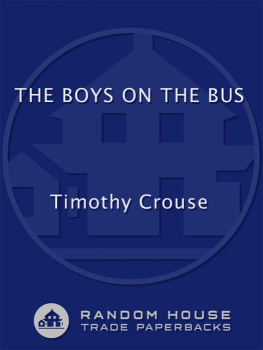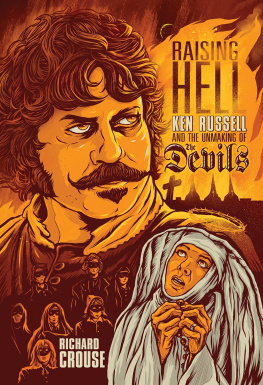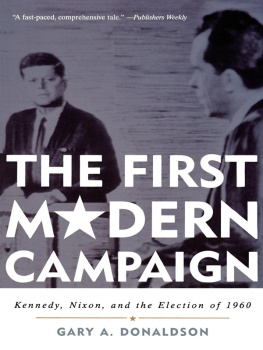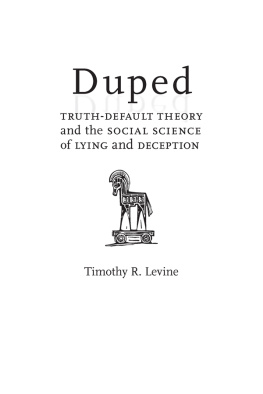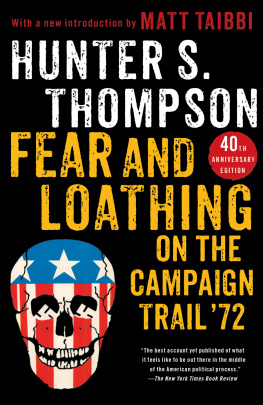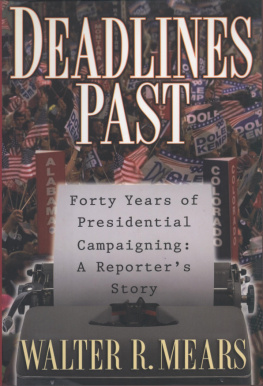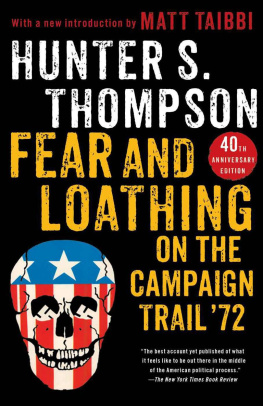Praise for The Boys on the Bus
All the secrets the definitive story.
The Washington Post
Crouse takes a big bite out of the hand that feeds news to Americaa mean, funny, absolutely honest book!
Hunter S. Thompson
Superbly accurate a titillating insiders expos a most significant contemporary work about our information machines.
The Philadelphia Inquirer
More than any other book I know of, The Boys on the Bus shows in cumulative anecdote and detail, how the campaign press does actually work. An extremely insightful and provocative book.
New York magazine
If you are puzzled about the prism through which you view events, if you have wondered what reporters are like in person, what are their strengths and their limitations, then this is your book.
David Halberstam
[The Boys on the Bus] does more to reveal the rivalry, competition, different styles used in the press than anything I have seen. Fascinating brief biographies of the chief political reporters.
The New York Review of Books
If, as I do, you love reporters one day and despair of them the next, you will love this book. But everyone who reads it will learn much that is valuable and fascinating about politics, psychology, and the press.
George McGovern
Provokes, perplexes, illuminates and amuses. If there is a press baiter on your Christmas list, please buy him this book.
Newsweek
Wit, a bouncy style, meticulous observation The Boys on the Bus has a brace of virtues.
The New Republic
Extraordinary [Crouse] is a remarkably shrewd observer.
Commonweal

2003 Random House Trade Paperback Edition
Copyright 1972, 1973 by Timothy Crouse
Foreword copyright 2003 by Hunter S. Thompson
All rights reserved under International and Pan-American Copyright Conventions. Published in the United States by Random House Trade Paperbacks, an imprint of The Random House Publishing Group, a division of Random House, Inc., New York, and simultaneously in Canada by Random House of Canada Limited, Toronto.
R ANDOM H OUSE T RADE P APERBACKS and colophon are registered trademarks of Random House, Inc.
This book is based upon an article that originally appeared in Rolling Stone, issue #119, October 12, 1972.
This book was originally published in hardcover by Random House, Inc. in 1973.
Grateful acknowledgment is made to the following for permission to reprint previously published material:
ROWLAND EVANS , JR ., AND ROBERT NOVAK : Excerpts from five newsletters, copyright 1973 by the Evans-Novak Political Report Company; excerpt from one column, copyright Publishers-Hall Syndicate. Reprinted by permission of Rowland Evans, Jr., and Robert Novak.
INTERNATIONAL FAMOUS AGENCY : Excerpt from Will Ambition Spoil St. George?, by Richard Reeves, from New York, May 8, 1972. Reprinted by permission of International Famous Agency.
The New York Times: Excerpts from The McGovern Image, by James M. Naughton, July 31, 1972, and Palm Springs Idyll: Agnew and His Pals, by James Wooten, October 10, 1972. Copyright 1972 by The New York Times Company. Reprinted by permission of The New York Times.
Newsweek: Excerpt from McGoverns Politics of Righteousness, by Peter Goldman and Richard Stout (Newsweek, November 6, 1972), copyright 1972 by Newsweek, Inc.; excerpt from My Turn: Richard Dougherty The Sneaky Bumbler (Newsweek, January 8, 1973), copyright 1973 by Newsweek, Inc. Reprinted by permission of Newsweek.
HENRY REGNERY COMPANY AND STERLING LORD AGENCY : Excerpt from pages 132133 of Running: A Nixon-McGovern Campaign Journal, by Bob Greene, published by Henry Regnery Company (Chicago), copyright 1973 by Bob Greene. Rights outside of North America are controlled by the Sterling Lord Agency. Reprinted by permission of the Regnery Company and the Sterling Lord Agency, Inc.
THE STERLING LORD AGENCY , INC .: Excerpt from Nixon, by Nicholas von Hoffman (New American Review #11), copyright 1971 by Nicholas von Hoffman. Reprinted by permission of the Sterling Lord Agency, Inc.
The Washington Post: Excerpts from The Presidents Shield, by David S. Broder, October 1, 1972; McGoverns Emotions Are Showing, by William Greider, September 10, 1972; The McGovern Course, by William Greider, August 1, 1972. All articles copyright 1972 by the Washington Post.
Library of Congress Cataloging in Publication data is available.
eISBN: 978-0-8041-4983-9
Random House website address: www.atrandom.com
v3.1
FOREWORD
Hunter S. Thompson
This book holds a very special place in my heart for at least three excellent reasons, personal, professional and otherwise. I guess you could say I have a crush on it, a primitive sort of love that feels almost like parenthood and borders, perhaps, on lust. Which is true, for good or ill, because I watched The Boys on the Bus develop from start to finish, from a brilliant idea to the elegant and legendary political classic that it is today, particularly among smart journalists and professional politics junkies who do little else in their lives except cover Presidential campaigns and major political stories out of Washington. They are big-time people in big-time jobs who like getting Presidents elected (OR DEFEATED) and massively influence public opinion.
Tim Crouse and I are close friends now, but it was not always that way. He was a total stranger when I first laid eyes on him at that fateful Rolling Stone editorial conference in the summer of 1971, which seemed like a routine laid-back stag picnic on a secluded mountainside in Big Sur, California, for no particular reason except getting to know each other and pondering the editorial content of the magazine for the coming year. It looked like a free lunch. Ho ho ho.
I was on my way to Saigon at the time, eager to see and feel and know the ugly war that had been such a gigantic part of my life for so many years and for so many violent confrontations with police in what seemed like every city in the nation between Miami Beach and Boston to the streets of L.A. and the lunatic outdoor Rock Festivals in the hills around Portland and Seattle. It was a wild time and those of us who grew up in it were developing into a wild and confrontational breed.
It was a tough crowd to break into. We had already toppled one President of the United States, and we would soon be toppling another. Indeed. We had been to the Mountain more than once, and if we hadnt entirely prevailed, we were nowhere near defeated. We were warriors, and we were not afraid of the White House or anything they could do to us. We were champions, and the President was not.
This was the heady world that young Tim Crouse wandered into when he arrived in Big Sur that weekend. The way I recall it, he was still a student at Harvard, and his only experience in professional journalism had been as a low-paid low-ranking stringer writing occasional music stories out of Harvard and Cambridge and the Boston Naval Yard, where rock & roll was just taking root a punk kid who knew absolutely nothing about Politics, though he did have a knack for the music scene, and a sense of humor. All right, all right, if you want to be a stickler for accuracyand Crouse always was, the bastardhe was actually almost three years out of Harvard, and had gone to Morocco with the Peace Corps and then made his bones on a couple of Boston newspapers and joined the staff of Rolling Stone. All of which may be true, but he still looked pretty damn green to mea grizzled veteran of two wartime Presidential campaigns.

